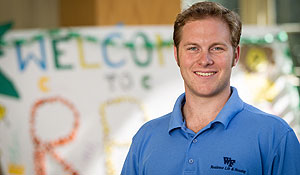Lead where you live
When Ethan Groce (’13) came to Wake Forest, he wanted to be a leader. So, in addition to becoming a President’s Aide and taking an active role in Student Government, he decided to follow in the footsteps of someone he admired and respected: his resident adviser.
“RAs are the go-to people for campus information and networking, plus they tend to be interesting, energetic and lively people,” Groce said. “It’s a perfect role if you’re motivated to be a leader, an advisor, a helper and a friend.”
Groce, a senior elementary education major from St. Louis, Mo., is entering his third year as an RA. This year, he is one of 108 – all of whom must balance their responsibilities with friendly demeanors on a daily basis.
While resident advisers at one time might have been mistaken for live-in tour guides or policy enforcers, today there is no question that they play a pivotal role in helping students with the adjustment to college life.
Armed with intensive training from Residence Life and Housing, with the help of the Counseling Center, Office of Diversity and Inclusion, and University Police, RAs serve on the front lines of everything from minor roommate disagreements to more serious emergency situations, according to Dean of Residence Life and Housing Donna McGalliard.
“It’s always scary when you get a late-night call. Through training, in-service programs, conferences and exchange programs, we provide our RAs with a network and support system so they feel prepared to act accordingly in any given circumstance,” McGalliard said. “Once the adrenaline kicks them into RA mode, our students know exactly what to do. They reach into their bag of skills and consistently step up to the plate.”
Earlier this year, Groce attended a leadership symposium with RAs from neighboring ACC schools Virginia Tech and UNC to universities as far away as Germany and Mexico. He has also taken part in an international RA exchange program at Wilfrid Laurier University in Ontario and hosted a peer from Monterrey Tech in Mexico – cross-campus collaborations with the purpose of sharing best practices and bringing new ideas back to participants’ respective schools.
 Groce says while he has handled his share of fun and serious situations, some find it surprising that his most trying experience as an RA has not involved a crisis, a roommate disagreement or even alcohol.
Groce says while he has handled his share of fun and serious situations, some find it surprising that his most trying experience as an RA has not involved a crisis, a roommate disagreement or even alcohol.
“Believe it or not, the most challenging issue is when residents don’t open up. It is important for me to become familiar with my residents and understand who they are and what their needs are.”
He says gaining trust is especially important when residents are first-year students and might not have established their own social networks on campus. So, he makes a concerted effort to talk to his residents in the lounge, eat with them in the Pit, or go to the movies together.
According to Groce, not only have the skills he has learned as an RA been valuable in building community and keeping residents safe, they also translate nicely into life outside of Wake Forest. Being a team player, flexible, generous and self-motivated are traits good RAs share.
“To me, the biggest benefit is communication. Interpreting body language, talking through difficult situations, and learning how to calm people are all skills I’ll definitely need in my career as a teacher,” he said. “Since residents generally live near their RA, there are times when they come to you with a problem or personal thing in their life. It’s a very nice feeling when someone comes to you for advice.”
Categories: Experiential Learning, Mentorship, University Announcements
Media Contact
Wake Forest News
media@wfu.edu
336.758.5237



